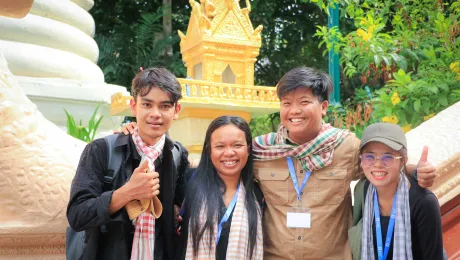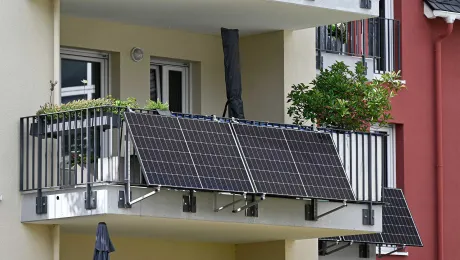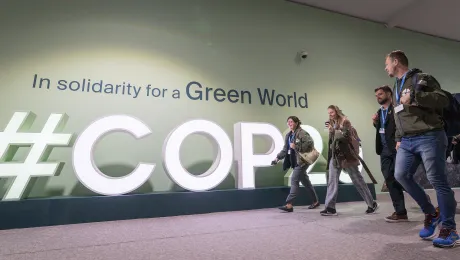As this year’s COP28 conference completes its first week and negotiations arrive at their halfway mark, LWF delegates take stock of progress made so far, and review specific focuses for what lies ahead.
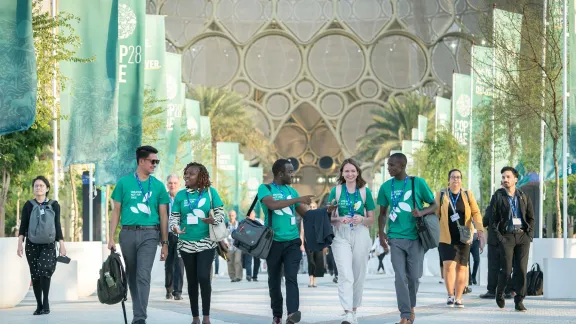
Young delegates from the Lutheran World Federation pictured at the United Nations climate summit COP28. Photo: LWF/A. Hillert
LWF delegates mark halfway point at COP28
(LWI) - “I feel the need to fight for mother earth.” The words by Sandra Kwamboka Ombese – a youth leader and climate activist from the Kenya Evangelical Lutheran Church, a member church of the Lutheran World Federation (LWF) – are spoken as world leaders, negotiators, people of faith and representatives from broader civil society all gather in Dubai, United Arab Emirates, for the annual United Nations Conference of the Parties (COP).
Online and onsite, the LWF facilitates participation of more than 60 people coming from 29 member churches in Asia, Europe, Latin America and the Caribbean, Africa, and North America.
For the youth, it is an opportunity to grow spiritually, practice leadership skills, and to engage in climate change-related decision-making including enabling them to provide solutions to a crisis that ultimately affects us all.
As this year’s conference (COP28) completes its first week and negotiations arrive at their halfway mark, LWF delegates take stock of progress made so far, and review specific focuses for what lies ahead.
"Our climate justice advocacy is grounded in evidence and human rights, which are essential to accelerating climate justice and action at all levels. At COP28, we are raising the voices and concerns of communities on the frontlines of climate change impact,” says LWF program executive for climate justice Elena Cedillo, who co-organizes the work of the LWF delegation.
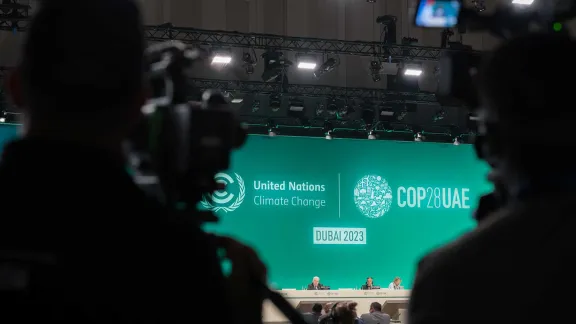
A World Leaders Summit plenary session is underway in the first week of the United Nations Conference of the Parties (COP) in Dubai 2023 (COP28). Photo: LWF/A. Hillert
Challenges abound as world convenes to resolve climate emergency
One early success of COP28 was the decision to operationalize a so-called Loss and Damage Fund, a major milestone of COP27 last year to address the needs and priorities of those affected by climate-related loss and damage.
Yet questions remain about how the fund will actually be financed – including whether funds now announced by governments are new and additional, or simply a reallocation of funds previously pledged for adaptation or mitigation, in which case the harm could be as great as the benefit of allotting them now to loss and damage.
But COP28 has also seen other controversies in the first half of the conference.
The conference’s president – whose task it is to help advance negotiations towards a robust outcome to address an escalating global crisis – has been reported in global media to claim there is no science to support the need for a phase-out of fossil fuels, a comment in direct contradiction to statements made by the United Nations’ secretary general at the very same summit.
On top of that, media reports say 2,456 representatives of coal, oil and gas industries are among the 110,000 registered for the COP this year – more than four times the number noted for COP27 in Sharm al-Sheikh and a major issue raised by many party negotiators and civil society representatives alike as undermining the credibility of the current process.
Even so, faith communities and civil society are hard at work accompanying and advocating at the summit, as negotiations continue to unfold.
"It is too early to say where the negotiations are going and what the final outcome will be," said Cedillo. "Many informal meetings are still ongoing, and the texts that will reflect the outcomes of the COP are far from the texts that will be ready for negotiation next week. There is more work to be done to make renewable energy and energy efficiency targets part of the negotiated outcome and a clear pathway to ambitious nationally determined contributions (NDCs) in this year's global stocktake,” she said.
“There has been some good news so far, but we expect much more,” she continues. “One thing we need to advocate for is enough funds to go into the climate crisis response, especially through the Loss and Damage Fund. But more importantly, we need to ensure those funds are really being made accessible quickly to the communities that need them.”
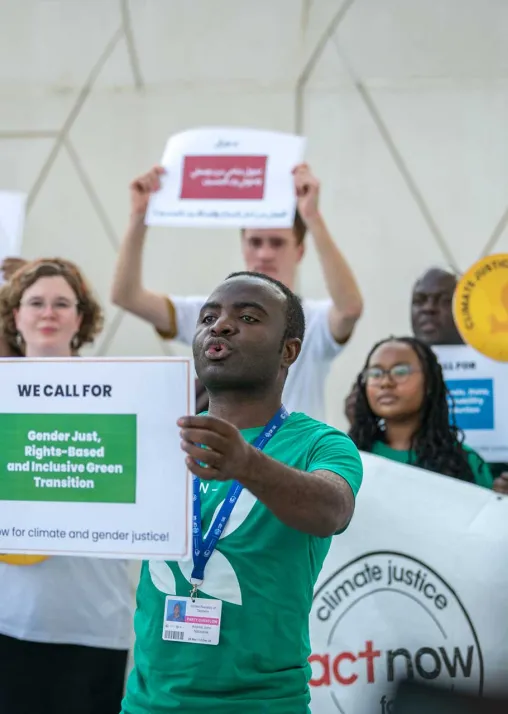
Anania John Ndondole of the Evangelical Lutheran Church in Tanzania participates in an advocacy action for gender justice together with Christians from various, at the United Nations climate summit COP28. Photo: LWF/A. Hillert
Climate engagement a matter of faith, ‘being God’s hands in the world’
The LWF delegation to COP for more than 10 years running has been a space for young people to take the lead in the communion’s efforts to both influence climate policy at the global level and build momentum for climate justice among local communities and national level around the globe.
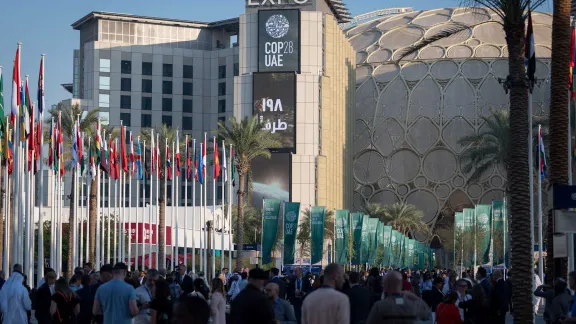
People from all over the world gather at Expo City in Dubai, venue of United Nations climate summit COP28. Photo: LWF/A. Hillert
As delegates reflect on COP28 and the work that now lies ahead, the interconnection between faith, Lutheran identity and efforts for climate justice is evident.
Erick Boniphas Kapira and Anania John Ndondole – both from the Evangelical Lutheran Church in Tanzania – articulate the local to global dimension of COP28.
“Through the engagement in COP28, I’m going with high energy to enhance more young people in my church, to join our networks,” Ndondole said.
”The people who are affected by climate change, we live with them, in local communities. So we need as youth to use our ability to make a change and to help them live in a beautiful world,” Kapira added.
For LWF delegate Ole Andreas Grøtte Børnes – a theologian and youth council member from the Church of Norway attending COP28 in person – climate engagement stems from the Church’s call to be God’s hands in this world.
“I believe God has called us to love our neighbor, and this includes not only the people in our own neighborhood, but also our neighbors across the globe who are experiencing the impacts of climate change,” Grøtte Børnes said.
“It is at the heart of the church to serve people. Every engagement in climate change, for climate justice, is a small seed of love, of the hands of God. Whether it is recycling plastic, shifting from a fossil-fuel-driven car to an electric one, influencing your politicians, or to end oil extraction operations, I see every such act as a work of love, for us as individuals, for society, and for our planet,” he added.
Carine Josiéle Wendland, a delegate from the Evangelical Church of the Lutheran Confession in Brazil and member of the Forum for Climate Justice in Latin America and the Caribbean, continues: “In this moment we need concrete action, to approach the most vulnerable in our communities – indigenous peoples, women, youth, children – and listen to them.”
Wendland adds, “For me the spiritual dimension is very important for climate justice, because it leads to action. My faith makes me engage in efforts for a common cause, for our common home.”
“As Lutherans we believe that we are saved by faith alone,” reflects Haposan Cornelius Sinaga from the Protestant Christian Batak Church (HKBP), a young lecturer at the Seminarium Sipoholon in North Sumatra.
“But this faith needs to be implemented into good actions to address the issue of human rights, gender justice and climate justice for all, especially for the most vulnerable,” he concludes.
The LWF participates in the 28th UN Climate Change Conference (COP28), which takes place in Dubai, United Arab Emirates, from 30 Nov - 12 Dec 2023. This engagement is part of the communion’s ongoing focus on strengthening climate action and advocacy at all levels. Young people are vital agents of change and form a greater part of the LWF’s delegation to COP28.
